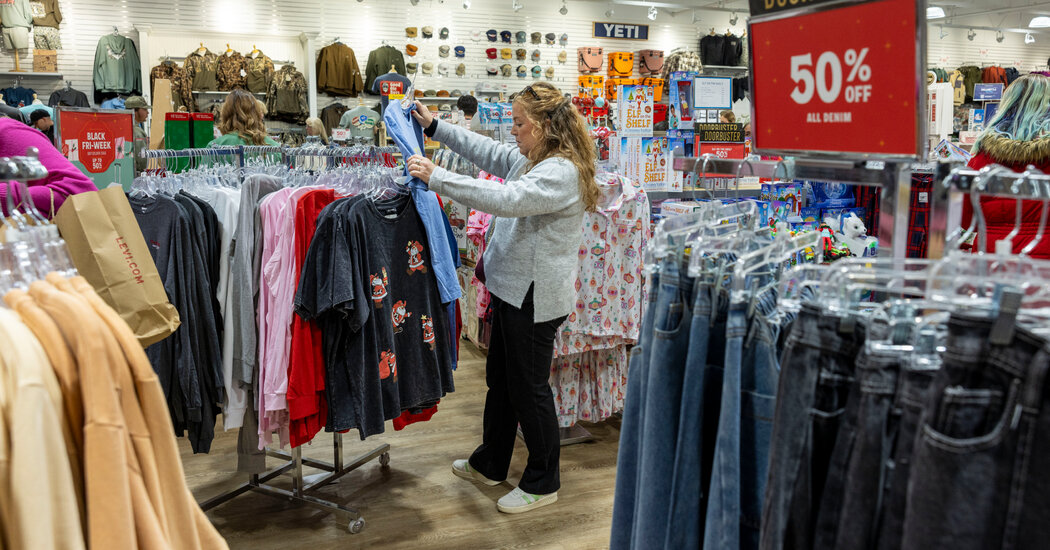
Trump’s Tariff Agenda Bets on Americans Giving Up Cheap Goods
President Trump’s sweeping tariffs are expected to raise the cost of cars, electronics, metals, lumber, pharmaceuticals and other products that American consumers and businesses buy from overseas.
But Mr. Trump and his advisers are betting that it can sell an inflation-weary public on a provocative idea: Cheap stuff is not the American dream.
“I couldn’t care less if they raise prices, because people are going to start buying American-made cars,” Mr. Trump said on NBC’s Meet the Press show on Sunday in response to fears of foreign car prices spiking.
The notion that there is more to life than low-cost imports is an acknowledgment that tariffs could impose additional costs on Americans. It is also a pitch that the burden will be worth it. Mr. Trump’s ability to convince consumers that it is acceptable to pay more to support domestic manufacturing and adhere to his “America First” agenda could determine whether the president’s second term is a success or a calamity.
But it is not an easy sell. The onslaught of tariffs has roiled markets and dampened consumer confidence. Auto tariffs that go into effect on Thursday will add a 25 percent tax on imports of cars and car parts, likely upending pricing in the sector. Mr. Trump has already imposed tariffs of 20 percent on Chinese goods and more are expected later this week, when the president announces his “reciprocal” tariffs on major trading partners, including those in Asia and Europe.
In confronting anxiety over the trade uncertainty, Mr. Trump and his top economic aides have resorted to asking Americans to think about the bigger picture. They espouse the view that Mr. Trump’s trade wars are necessary to correct decades of economic injustice and that paying a bit more should be a matter of national pride.
“We may have, short term, a little pain,” Mr. Trump said last month as he unveiled tariffs on Canada and Mexico. “People understand that.”
Treasury Secretary Scott Bessent put it bluntly earlier this month when he pushed back against the idea that inexpensive products should be what Americans aspire to have. “Access to cheap goods is not the essence of the American dream,” he said in a speech to the Economic Club of New York.
Mr. Bessent, a former hedge fund investor who is worth hundreds of millions of dollars, underscored that point in a follow-up interview on NBC, arguing that prosperity is not about buying “cheap baubles from China.”
“The American dream is not ‘let them eat flat screens,’” he said, arguing that it is instead about having good jobs that are not lost to foreign competition and wages that are high enough to afford homes.
The comments renewed a debate within the Republican Party over the merits of trade barriers that in recent years has sidelined traditional conservatives who prize free trade. Former Vice President Mike Pence shot back at Mr. Bessent, asserting on social media that the Treasury secretary misunderstood the aspirations of Americans.
“Tariffs are good as a means to bring nations like China to the table, but free trade lowers the costs of goods and improves the quality of life for every American,” Mr. Pence wrote on the social media platform X.
Concerns about China’s economic practices have unified Republicans and Democrats. But they remain divided on the best approach to combating Chinese excess industrial capacity and its dumping of cheap goods around the world.
While the Biden administration attempted to confront this dynamic with targeted tariffs and federal subsidies directed at clean-energy technology and semiconductors, the Trump administration is embarking on an industrial strategy built around broad-based tariffs and tax cuts.
But the haphazard rollout of the tariffs and the fact that any changes to the tax code will not occur until later this year have left economists, trade experts and analysts wondering about the viability of Mr. Trump’s strategy and doubtful that his administration can convince consumers that they are better off with higher prices.
“My bet would be that people will not be willing to swallow higher prices, lower 401(k)s, lower wealth in exchange for the principle of a nationalistic economy,” said Stephen Haber, a professor and senior fellow at the Stanford Institute for Economic Policy Research and the Hoover Institution. “Reality tends to trump ideology for most people.”
Mr. Haber recalled that in the 1970s, President Jimmy Carter appealed to Americans to embrace austerity as the nation tried to combat inflation, and it proved difficult to entice the country to embrace self-imposed hardship. Economic pain was unpopular and Mr. Carter only served one term.
To skeptics of Mr. Trump’s approach, the tariff drama appears to be an emergency of the president’s own making.
Economic surveys have shown that Americans are willing to spend more to “buy American” in some cases, but only to a point. The timing of Mr. Trump’s tariff initiatives is particularly perilous because his victory last November was due in part to deep frustration that Americans felt after years of soaring prices during the Biden administration.
Barry P. Bosworth, who led the Carter administration’s “Wage‐Price Council” from 1977 to 1979, said that he believed it would be difficult for Mr. Trump to sell Americans on policies that could increase prices, considering that the economy Mr. Trump inherited was relatively healthy.
“I think Trump’s administration will make a mistake if they don’t recognize that they won the election in large part because of the inflation experience of the Biden administration,” Mr. Bosworth said.
Supporters of Mr. Trump’s trade strategy note inflation was low during his first term, and that tariffs are part of a broader agenda of tax cuts and deregulation that could theoretically boost the economy.
“Tariff policy is only a small part of the overall policy,” said Tomas J. Philipson, who served as acting chair of the Council of Economic Advisers during Mr. Trump’s first term. He believes that the benefits of tax cuts and deregulation will outweigh the impact of the tariffs.
Although Mr. Bessent has been recently emphasizing his view that declining U.S. industrial capacity has eroded America’s fortunes, he made similar arguments last year as an adviser to Mr. Trump.
“While many economists pointed to the overall efficiency gains associated with this labor disruption, cheaper toys and televisions were little recompense for the loss of reliable earnings and the meaning that work brings to people’s lives,” Mr. Bessent said at a conference last October.
At the Economic Club of New York in March, Mr. Bessent pointed to a recent study that found communities that were hit hardest by cheap imports have recovered in recent decades, but manufacturing workers who lost their jobs never fully recouped their earnings.
One of the study’s authors, the M.I.T. economist David Autor, said he thinks Mr. Bessent has a point when he contends that cheap televisions do not equate to prosperity if it means that millions lose their jobs. He said that protecting certain industries from foreign competition and investing in them could be a wise approach.
However, Mr. Autor was unconvinced that Mr. Trump’s economic policies would accomplish what he aims to achieve. He pointed to planned cuts to federal spending and investment subsidies, which predominately benefit conservative states. He said that Mr. Trump’s tariffs would be “incredibly destructive” to American firms and noted that the levies he imposed during his first term had little economic benefit.
“I think the policies that Trump is engaging in right now are going to be most harmful to his constituents,” Mr. Autor said.










